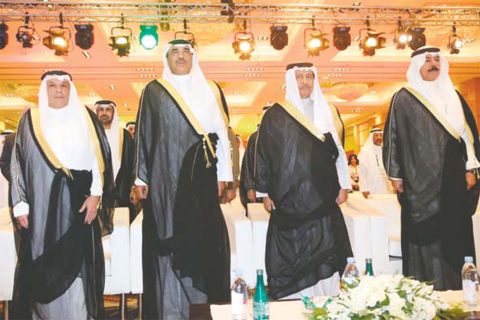 (From left) Defense Minister Sheikh Khaled Al-Jarrah Al-Sabah, Foreign Minister Sheikh Sabah Al- Khaled Al-Sabah, HH the Prime Minister Sheikh Jaber Al-Mubarak Al-Sabah and Interior Minister Sheikh Mohammad Al-Khaled Al-Sabah attend a conference during the Kuwait Oil and Gas show (KOGS 2015) yesterday. (Inset) Oil Minister Ali Al-Omair delivers a speech during the conference. — Photos by Yasser Al-Zayyat
(From left) Defense Minister Sheikh Khaled Al-Jarrah Al-Sabah, Foreign Minister Sheikh Sabah Al- Khaled Al-Sabah, HH the Prime Minister Sheikh Jaber Al-Mubarak Al-Sabah and Interior Minister Sheikh Mohammad Al-Khaled Al-Sabah attend a conference during the Kuwait Oil and Gas show (KOGS 2015) yesterday. (Inset) Oil Minister Ali Al-Omair delivers a speech during the conference. — Photos by Yasser Al-ZayyatKUWAIT: Kuwait will not slow the development of its oil industry projects in response to the fall of crude prices, Oil Minister Ali Al-Omair told an industry conference yesterday. The chief executive of state energy giant Kuwait Petroleum Corp, Nizar Al- Adsani, told the conference that his company had spent KD 4 billion ($13.2 billion) in the 2014/15 fiscal year and KD 2 billion so far in the current fiscal year on strategic oil projects. He said KPC was now studying several investment opportunities, including petrochemicals, in Asia and North America. He did not elaborate.
Omair, also Minister of State for National Assembly Affairs and Chairman of KPC, said the oil and gas industry around the globe was keen on absorbing impact of declining oil prices, especially with the emergence of other lucrative energy resources. KPC, said Omair, has launched initiatives aimed at supporting partnerships to back the national economy coupled with boosting private sector’s role in development.
These initiatives, he added, encourage transfer of knowledge, modern technology and services, in addition to offering training for national manpower towards the establishment of manufacturing industries in Kuwait. Omair said low oil prices would not undermine Kuwait’s plans to develop strategicallyimportant oil projects, which included oil and gas exploration, refining and distribution of crude oil. “These projects will improve the environment and safety performance in our refineries, as well as providing new jobs and supporting economic growth in the country,” he said.
Omair said the clean fuel project aims at developing and expanding the refineries in Mina Abdullah and Mina Ahmadi with the objective of transforming them into a refining complex, designed to honor oil market needs and boost the competitive nature of the Kuwaiti products. Omair said the Zour refinery project, which would produce 615,000 bpd, was on schedule and would ultimately provide low-sulfur fuel to power stations. He called for doubling efforts to provide sustainable energy for the future generations.
Kuwait currently produces about 3 million barrels per day of crude oil and by 2020 it will be able to produce 4 million bpd, Adsani said. He said KPC would build four gathering centers to boost natural gas and heavy oil production. Adsani said KPC has allocated KD 32 billion for development projects in the five-year plan. KPC, he added, was contributing to the development of private sector’s role in development as well as diversifying income. Last week, International Energy Agency head Fatih Birol said the fall in global upstream oil investment in 2015 would be at least 20 percent versus 2014 and the biggest drop in history.
OPEC secretary general Abdullah El-Badri said OPEC is confident that the oil market will be “more balanced” next year as non-OPEC production has contracted and global demand is increasing. “OPEC is confident that it will see a more balanced market in 2016,” Badri told the oil and gas conference. “In recent months, there has been a contraction in production from non-OPEC producers and an increase in global demand,” he said.
However, Badri also admitted that the “market remains oversupplied”, and insisted that stability is paramount to the crude market which faced “extremely challenging times”. The OPEC chief said market fundamentals did not support the sharp drop in oil prices which have fallen by almost 60 percent since June 2014. Badri said that global demand for oil is forecast to rise to 110 million barrels per day by 2040 from 93 million bpd now. “This requires investments of $10 trillion between now and then,” he said.
Earlier yesterday, Qatar’s Energy Ministry Mohammed bin Saleh Al-Sada, who is acting OPEC president, said there were signs of an oil price rise next year, adding that the oil price has “bottomed out”. He said world GDP growth in 2016 is slated to be 3.4 percent as against an expected 3.1 percent in 2015, and that this would result in an increase in global oil demand by 1.3 to 1.5 million bpd. Growth in supplies from non-OPEC producers over the past five years has substantially reduced in 2015 and is likely to show zero to negative growth in 2016, the statement said.
Venezuela - which has been trying hard to persuade oil producers to cut output to boost prices - said Thursday a technical meeting of OPEC and other crudeproducing countries would take place on Oct 21. Badri yesterday confirmed the meeting would take place at an expert level and that OPEC and non-OPEC producers will attend. — Agencies










